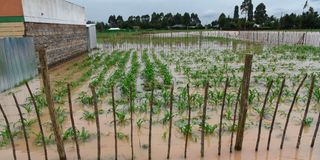Floods serious threat to our food security

A maize farm flooded in Baraka, Eldoret town, Uasin Gishu county on May 4, 2024 after heavy rains.
As the country grapples with widespread devastating floods, the spectre of famine looms large. For countless farmers who rely on the long rains to sow and nurture their crops, the excessive rainfall has brought despair instead of hope.
Fields once fertile with promise are inundated with water, drowning the dreams of a bountiful harvest. Immediate intervention is crucial to avert a humanitarian catastrophe.
There are several practical steps the government can take to safeguard national food security. First, it should provide emergency assistance to flood-affected farmers, including access to food aid, shelter and healthcare. This includes the establishment of relief centres in the affected areas to distribute essential supplies and offer support services.
It should then conduct a rapid assessment of crop damage and provide targeted support to farmers to rehabilitate their land. That includes distribution of seeds, (genuine) fertiliser and agricultural inputs to help farmers replant and salvage their harvests.
Dsaster preparedness
In the medium term, let it invest in resilient infrastructure to mitigate the impact of floods and improve water management. It should construct better drainage systems, dams and levees to control flooding and curb waterlogging in farmlands.
One crucial lesson from the flooding situations is the importance of heeding early warning systems (EWS) and strengthening disaster preparedness. While the experts have warned about future floods, we are guilty of being lax and doubtful of those predictions. We are learning the hard way that we should never discount science. We must enhance our meteorological forecasting capabilities and disseminate timely warnings to at-risk communities.
Besides, the floods are a stark demonstration of the devastating effects of climate change. To protect our farmers, we must promote climate-resilient agricultural practices. The recently celebrated tree planting day was a good idea, though not so well executed. Tree planting should not be an occasion but rather a continuous culture.
Food security
Another key aspect of safeguarding food security is promoting crop insurance. Farmers who had crop insurance are in a much better position than those who did not. The cost of insurance is relatively small compared to the benefits yet many farmers neglect it. In a recent case in Tana River County, farmers who had taken insurance were compensated by one of the leading insurers in the country.
Lastly, we should foster collaboration between national and county governments, as well as private sector stakeholders, to coordinate policy responses and ensure effective governance. Let’s have establishment of clear mandates and accountability mechanisms to enhance transparency and promote inclusive decision-making.
By prioritising these practical interventions, the government can take decisive steps to mitigate the immediate impacts of the floods and safeguard Kenya’s food security in the long term. However, time is of the essence, and concerted action is needed to prevent a famine disaster tomorrow.
Ms Wanjiku is the MD, EFKen Leasing. [email protected].





